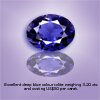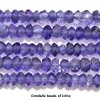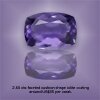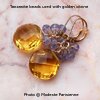 Legend has it that when the initial Viking mariners ventured deep into the Atlantic Ocean they used a secret gem compass that helped them in determining their position. This gemstone, as it was later found out, was the natural iolite gemstone. Ancient mariners considered it as the world?s first polarizing filter. By using thin pieces of iolite gem and looking through it, navigators could determine the exact position of the sun and thereby navigate their way safely to the New World and back.
Legend has it that when the initial Viking mariners ventured deep into the Atlantic Ocean they used a secret gem compass that helped them in determining their position. This gemstone, as it was later found out, was the natural iolite gemstone. Ancient mariners considered it as the world?s first polarizing filter. By using thin pieces of iolite gem and looking through it, navigators could determine the exact position of the sun and thereby navigate their way safely to the New World and back.
 Iolite gemstone is the more commonly used name for the mineral Cordierite that is named after the French geologist P.L.A. Cordier. It is also one of the most commonly used gem variety that exist in the Cordierite group. Iolite has several references in history, the earlier ones being associated with the Grfeek word ?ion?. In the Greek language, Ion refers to the color violet and its purplish blue color when cut and faceted.
Iolite gemstone is the more commonly used name for the mineral Cordierite that is named after the French geologist P.L.A. Cordier. It is also one of the most commonly used gem variety that exist in the Cordierite group. Iolite has several references in history, the earlier ones being associated with the Grfeek word ?ion?. In the Greek language, Ion refers to the color violet and its purplish blue color when cut and faceted.
 Another ancient Greek name associated with the iolite gem is ?dichroite? or two-colored rock. This name actually portrays the strong pleochroism quality that the gem has. Iolite was also known as water sapphire in the ancient days as a cube cut from natural iolite rough resembles a sapphire from one side - clear as water from the other end and honey yellow from the top. Closer to home in India, the gem is known as kakaneeli.
Another ancient Greek name associated with the iolite gem is ?dichroite? or two-colored rock. This name actually portrays the strong pleochroism quality that the gem has. Iolite was also known as water sapphire in the ancient days as a cube cut from natural iolite rough resembles a sapphire from one side - clear as water from the other end and honey yellow from the top. Closer to home in India, the gem is known as kakaneeli.
 Iolite jewelry has not yet become a craze in the market and you are unlikely to find iolite rings, iolite bracelets or iolite earrings and the like easily.
Iolite jewelry has not yet become a craze in the market and you are unlikely to find iolite rings, iolite bracelets or iolite earrings and the like easily.
The chemical composition of iolite is magnesium aluminium silicate (Mg2 Al 4 Si5 O18). The specific gravity ranges from 2.57 to 2.66 and the refractive index range vary between 1.53-1.54 and 1.54-1.55. Iolite?s hardness on Mohs scale ranges between 7 and 7.5.
Iolite Color
 The most striking feature of iolite gemstones are the pleochroism property that it has. The property is caused by an optical phenomenon by which the grains of a stone appear to have different colors when observed at different angles. The iolite gemstone exhibits very strong pleochroism that can be seen with the naked eye. It shows yellow, light blue and dark violet-blue pleochroic colors when viewed from different angles. And therefore it leaves many people wondering what color is iolite.
The most striking feature of iolite gemstones are the pleochroism property that it has. The property is caused by an optical phenomenon by which the grains of a stone appear to have different colors when observed at different angles. The iolite gemstone exhibits very strong pleochroism that can be seen with the naked eye. It shows yellow, light blue and dark violet-blue pleochroic colors when viewed from different angles. And therefore it leaves many people wondering what color is iolite.
 The gem quality iolite, typical of its pleochroism properties, varies in color from sapphire-blue to dark blue-violet and yellowish-gray to light blue, depending on the angle of light. In fact when tanzanite was first discovered it was thought to be iolite because of its blue color.
The gem quality iolite, typical of its pleochroism properties, varies in color from sapphire-blue to dark blue-violet and yellowish-gray to light blue, depending on the angle of light. In fact when tanzanite was first discovered it was thought to be iolite because of its blue color.
Cut
 Due to the pleochroic property of the iolite, it is very important that the gem stone rough be cut and faceted in the right crystal direction. If the gem is cut properly, the stone shows a deep blue color through the top and appears colorless if viewed from another angle. The manner in which the rough natural iolite is cut decides whether the colors that are displayed at different angles are the best possible that could have been obtained. If iolite is not cut from exactly the right direction, no matter what the shape of the raw crystal, its color will not be displayed to its best advantage.
Due to the pleochroic property of the iolite, it is very important that the gem stone rough be cut and faceted in the right crystal direction. If the gem is cut properly, the stone shows a deep blue color through the top and appears colorless if viewed from another angle. The manner in which the rough natural iolite is cut decides whether the colors that are displayed at different angles are the best possible that could have been obtained. If iolite is not cut from exactly the right direction, no matter what the shape of the raw crystal, its color will not be displayed to its best advantage.
Carat
Like any other gemstone, iolite is available in various sizes ranging between 1 carat to 10 carats. Fine quality iolite gems above 5 carat are very rare.
Clarity 
Iolite gem stone is mainly transparent or translucent stone. But they do reflect different colors based on the manner in which they are cut and the angle at which the light strikes the surface.
Iolite gem is not a very expensive gemstone to buy. The best color for Iolite gemstone is the beautiful violet blue which commands a premium price. Any traces of brown or yellow can significantly reduce the price. The price for an iolite, depending on the color ranges from $2 per carat to $100 per carat. Iolite beads are priced lesser than the cut and faceted gemstones.
 Markets and Producers of Iolite
Markets and Producers of IoliteIolite rough is mined primarily in India, Sri Lanka, Burma, Madagascar, Namibia, Tanzania and Brazil.
Iolite is one of the few gemstones that are made available in the market without being treated. They are neither heated nor are they passed through any surface tension treatment.

While blue sapphire, amethyst, scapolite and tanzanite are some of the gemstones that resembles iolite, the fact is that the iolite gemstone is considered to be a very popular simulant of the blue sapphire.
The natural production of this gem is sufficient to meet the current moderate demand. The demand is low since it is not one of the preferred gems for jewelry items like rings, earrings, necklaces, bracelets and pendants. Additionally, since iolite is not extremely popular as a gemstone yet, it does not warrant synthesization. No custom synthetic forms of iolite are available in the market today.
 Interesting Trivia and Other Iolite Facts
Interesting Trivia and Other Iolite Facts
Iolite is believed to awaken the third eye, stimulate visions and connect one with one?s own inner wisdom. It is said that it helps individuals live in the present as well.
Home | Add URL | About Us | Contact Us | Links | Privacy Policy | Resources | Sitemap | Design by Paper Tree
Copyright 2007 GehnaBazaar.com. All rights reserved. The information contained in this webpage may not be published, broadcast, rewritten or redistributed without a prior written consent. Natural Gemstones | Precious Gemstones | Jewellery Designers | Jewelry Institutes | Jewelery Design Institutes | Gemstone Information | Diamond Information | Gemmological Laboratories | Gem Labs | Jewelry Articles | Gold Price | Jewel Store | Buy and Sell Jewellery | Jewery Classes | Deisgn classes | Gemologists | Diamond Price